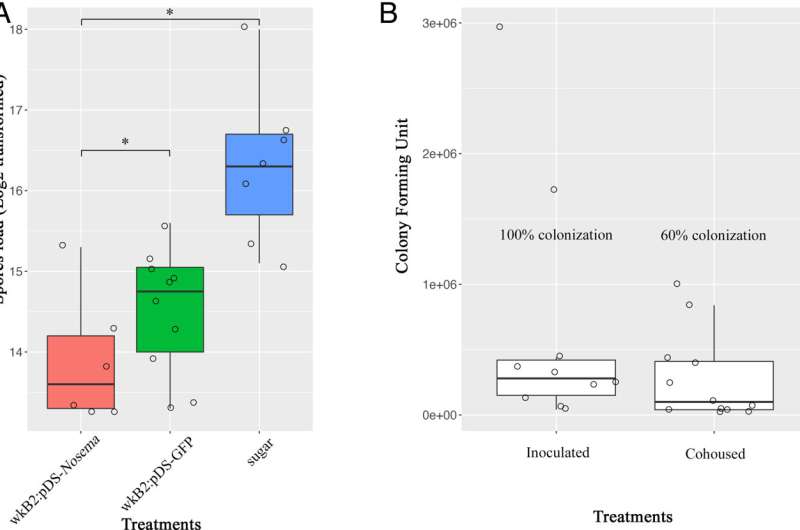June 13, 2023 report
This article has been reviewed according to Science X's editorial process and policies. Editors have highlighted the following attributes while ensuring the content's credibility:
fact-checked
peer-reviewed publication
trusted source
proofread
Engineering a bee-gut bacterium to prevent a deadly parasite from spreading

A group of integrative biologists at the University of Texas at Austin has engineered a bacterium that harmlessly infects the bee gut as a means to stop the spread of a deadly parasite that infects honeybees. Qiang Huang, Patrick Lariviere, J. Elijah Powell and Nancy Moran reported their results in the Proceedings of the National Academy of Sciences.
Colony failure has become a common term in recent years as millions of bees around the world are threatened by a variety of causes, including parasitic infections. One such parasite, Nosema ceranae, is particularly deadly to honeybees. The single-celled fungus infects cells lining the gut and spreads by injecting spores into cells, which are then defecated.
To date, efforts to protect honeybees from the parasite have not gone well—there is only one effective fungicide, but in addition to killing the parasite, it also harms the bees. Additionally, the parasite is developing a resistance to it. In this new effort, the researchers have taken a new approach, using bioengineering to prevent the parasite from spreading.
The team modified a bacterium called Snodgrassella alvi found in bee guts and nowhere else. Their work involved inducing it to produce a type of double-stranded RNA that is harmful to Nosema ceranae, preventing the parasites that enter cells from producing spores.
The researchers injected batches of engineered bacteria into test honeybee hives and then infected the hives in which they were living (in a sealed lab environment) with Nosema ceranae. They found that after just one week, 71% of the honeybees in the test hives were still alive compared to just 19% in a control group. They also found 90% fewer spores.
More work is required to ensure that the engineering process does not have any unintended side-effects for the honeybees and that it does not spread to other creatures if released into the wild before such an approach can be tested in a real-world environment.
More information: Qiang Huang et al, Engineered gut symbiont inhibits microsporidian parasite and improves honey bee survival, Proceedings of the National Academy of Sciences (2023). DOI: 10.1073/pnas.2220922120
Journal information: Proceedings of the National Academy of Sciences
© 2023 Science X Network
















